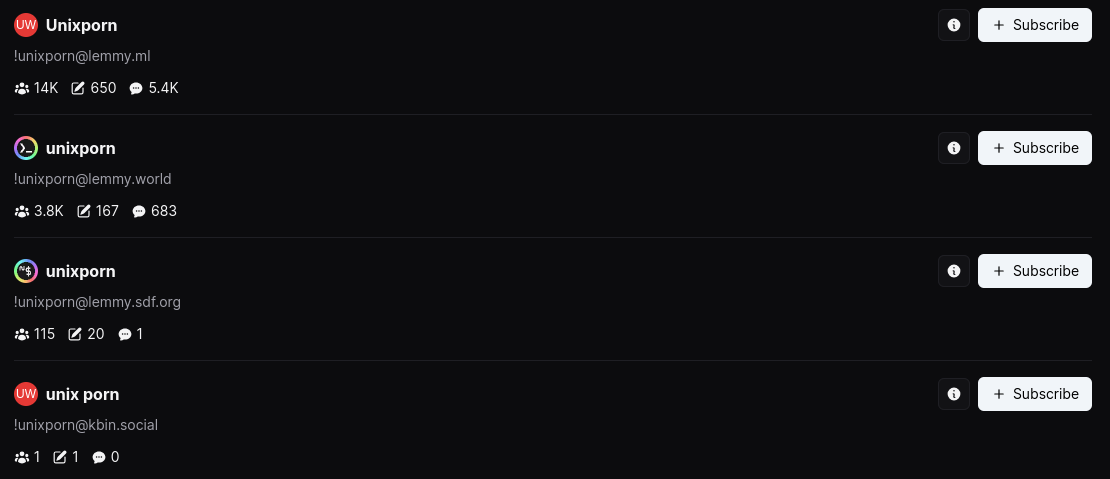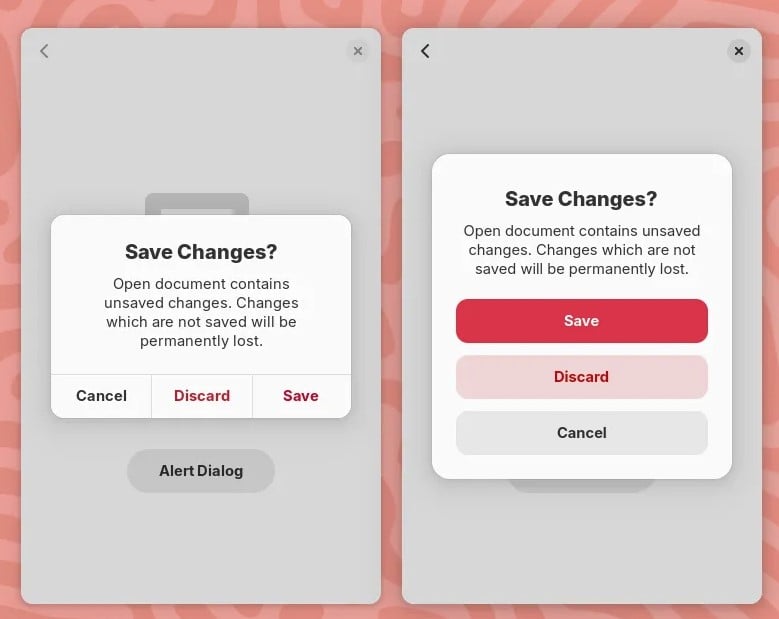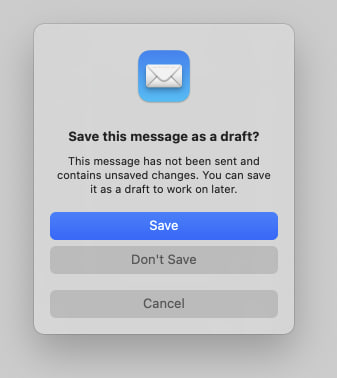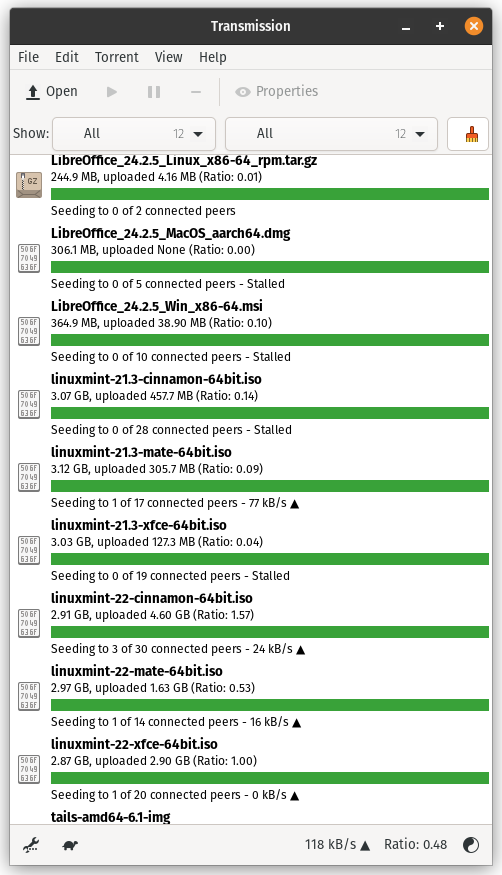Just a small way to help people get their FOSS. What are some other projects that have torrents that would be good to seed?
- @gramgan@lemmy.ml
- •
- 17h
- •
For me, I really want to get into [niri](https://github.com/YaLTeR/niri), but the lack of XWayland support scares me (I know there’s solutions, but I don’t understand them yet).
Also, I stopped using Emacs (even though I love its design and philosophy with my whole heart) because it’s very slow, even as a daemon.
I'm trying to get a job in IT that will (hopefully) pay more than a usual 9 to 5. I'm been daily driving Linux exclusively for about 2 1/2 years now and I'm trying to improve my skills to the point that I could be considered a so-called "power user." My question is this: will this increase my hiring chances significantly or marginally?
How to update BIOS on a system that only use Linux as OS.
Asking this because some clowns at Acer decided that they will only provide BIOS updates through Windows Update.
Edit: I'm not talking about installing the BIOS file. They **don't even provide BIOS file** in the first place.
So NVIDIA just doesn't cut it on Linux/proton I've come to learn. Looking at the best bang//buck, it this the AMD card people are flocking to? 7800 XT maybe?
- umami_wasabi
- •
- pk.fail
- •
- 2h
- •
I want to check if my Lenovo T480 is afftected by the recent PKFail, but have no idea how to extract the bios firmware for validation. Can someone detail the steps? Thanks.
I know most of you already know these apps or need something more advanced but I found them interesting so I thought I might as well share it here for those not familiar with them.
WARNING: one of the apps in the list (Plexamp) doesn't appear to be open-source so use it with caution.
Hi all, the private school I work at has a tonne of old windows 7/8 era desktops in a student library. The place really needs upgrades but they never seem to prioritise replacing these machines.
Ive installed Linux on some older laptops of mine and was wondering if you all think it would be worth throwing a light Linux distro on the machines and making them somewhat usable for a web browsing experience for students? They’re useless as is, running ancient windows OS’s. We’re talking pre-7th gen i5’s and in some cases pentium machines here.
Might be pointless but wonder what you guys think?
 English
English- •
- bazzite.gg
- •
- 1M
- •
Bazzite comes ready to rock with Steam and Lutris pre-installed, HDR support, BORE CPU scheduler for smooth and responsive gameplay, and numerous community-developed tools for your gaming needs.
Randomly on my laptop screen this appears and debian just freezes. Sometimes these vertical lines don't appear and system freezes anyway. Its just random. How do i identify if this is hardware or software issue? and then how to identify exact piece of hardware or software causing this problem.
- Adonnen English
- •
- 18d
- •
Hello, all. I just got handed down a Surface Go (1st gen, 4gb ram), and I want to use it as a note taking machine, document reader, and secondary display for my primary laptop (Framework intel 12th gen running Fedora GNOME).
I have a pen but no keyboard, so any config will be done with a usb keyboard, but usage will be like a tablet.
1. I have heard I should install GNOME on a tablet. I am generally ok with the 'opinionated' design of GNOME, but does anyone know what performance to expect? Would I be better off with a lightweight distro and de?
2. What apps can be recommended for stylus notetaking? Would prefer svg output, and simple workflow to export them to my main machine, where I can embed in markdown notebooks
3. Finally, the secondary display usage. Is this feasible? I know GNOME has RDP support, but my uni's wifi makes that very difficult, and I'd prefer a wired connection if possible. I don't need the stylus to work.
BONUS: If anyone has experience with the proprietary Surface Connect port, can it be adapted to usb c on linux, so that I can transfer power and >= 5gpbs of data? I see usb c adapters online, but they don't mention data; only power delivery.
 English
English- •
- i.imgur.com
- •
- 22d
- •
All my ducks seem to be in order and the correct configs in the right place. But i keep getting this message. As you can see the file exists. It is not empty, but systemctl cannot find it. Any help would be very very appreciated.
•fedora 40 xfce spin
•kernel 6.9.9.200
•fucking chromebook
Are we Wayland yet? Are we JPEGXL yet? Are we Rust yet?
I’ve gathered a meta-tracker for the adoption state of futuristic technologies.
Hi I'm looking for a retro style desktop environment (or maybe just some skin or something) for my Debian workstation. Preferably something that looks like Mac OS 9.
 English
English- •
- 17d
- •
I don't want to use [Osmc](https://osmc.tv/) or [LibreELEC](https://libreelec.tv/). What I'm going for is something like Android TV (tried using [LineageOS](https://konstakang.com/devices/rpi4/LineageOS21-ATV/) but that didn't work out for me).
I was interested in something like [Plasma Bigscreen](https://plasma-bigscreen.org/) but most of the tutorial is about 4 years old and point to using an [old image](https://sourceforge.net/projects/bigscreen/files/rpi4/beta/).
I installed the [Debian package](https://packages.debian.org/stable/kde/plasma-bigscreen). After that, I logged in and set `Automatic login`, and switch the session to `Plasma Bigscreen (x11)`. After applying and a reboot, it launched Plasma Bigscreen but some widgets (like the audio, KDE Connect) froze when clicking on them.
What do you recommend? I prefer to use a Raspberry Pi.
I undertook a sizeable upgrade today, bringing a skylake era build into the 2020s with a 13th gen. All core components- memory, motherboard, GPU, everything must go... except the drives. We were nervous, my friend really felt we should reinstall. There was debate, and drama. Considerations and exceptions. No, I couldn't let my OS go. I have spent years tweaking and tuning, molding my ideal computing environment. We pushed forward.
Well I'm pleased to say it was mostly uneventful. The ethernet adapter was renamed causing misconfigured dhcp, but otherwise it booted right up like nothing happened. Sorry, linux is boring now.
For those veteran linux people, what was it like back in 90s? I did see and hear of Unix systems being available for use but I did not see much apart from old versions of Debian in use.
Were they prominent in education like universities? Was it mainly a hobbyist thing at the time compared to the business needs of 98, 95 and classic mac?
I ask this because I found out that some PC games I owned were apparently also on Linux even in CD format from a firm named Loki.
My Fedora 40 system won't boot with any kernel over 6.8.10.
I've had this problem for about a month now and have been putting it off, as I haven't really been using my computer recently, but it needs to be addressed.
I'm running a Fedora 40 KDE 6 distro, which was upgraded from Fedora 39. It's been working pretty well for the half year I've been using it but recently I've encountered an issue. About a month ago, after upgrading my system to kernel 6.8.10, my system started to hang while in boot.
`
usb 1-10 device descriptor read/64, error -71
[ OK ] Started plymouth-start.service - Show Plymouth Boot Screen
[ OK ] Started systemd-ask-password-plymoūquests to Plymouth Directory Watch
[ OK ] Reached target paths.target - Path Units.
[ OK ] Found device dev-disk-by\x2duuid-dūsung SSD 970 EVO Plus 500GB fedora.
[ OK ] Reached target initrd-root-device.target - Initrd Root Device.
[ *** ] Job dev-mapper-cl\x2dswap.device/start running (xxs / no limit)
`
Fortunately Fedora saves the previous 2 kernels versions and I was able to boot into my computer using Kernel 6.8.9. When I went to check what was wrong I noticed that with kernel 6.8.10 it always hangs at this part of the boot process.
`[ *** ] Job dev-mapper-cl\x2dswap.device/start running (xxs / no limit)`
I understood that this has something to do with swap but I'm unsure what the issue is exactly. My Fedora install doesn't have a swap partition, it uses zram. I'm unsure if that's an issue.
I've reinstalled kernel 6.8.10 and it didn't fix the issue.
I've also upgraded my machine to use kernel 6.8.11 and see if that would fix anything, but it did nothing, and upgrading to 6.8.12 probably won't fix anything either.
I've installed a dnf plugin called versionlock meant to pin certain kernels as to not delete them and have already pinned kernel 6.8.9, but I'd still rather avoid upgrading.
What I really don't understand is what changed. Why does my system boot successfully in kernel 6.8.9 but fails in 6.8.10. I've read that others have had a similar experience with the 6.8.10 kernel on fedora, albeit for different reasons.
If someone can point me to the answers that would be great, but an explanation as to how to read that log and steps I could take to identify and troubleshoot would be just as welcomed.
**UPDATE**: In my /proc/cmdline I had an argument known called `resume=/dev/mapper/cl-swap` which was trying to find a swap partition that didn't exist.
I used the command `cat /proc/cmdline` to view my boot arguments and then ran the command `sudo grubby --remove-args=<resume=UUID=xxx> --update-kernel=ALL` where `<resume=UUID=xxx` was replaced with `resume=/dev/mapper/cl-swap`.
[Where I got my answer](https://discussion.fedoraproject.org/t/solved-boot-hang-job-dev-disk-by-x2uuid-no-limit/119111/3)
Thank you [Domi@lemmy.secnd.me](https://lemmy.ml/u/domi@lemmy.secnd.me) for linking the thread.
- @Telorand@reddthat.com English
- •
- 1M
- •
I'm working on my transition plan away from Windows and testing out various things in VMs as I do so, and one big hurdle is making sure the VPN client my work requires can connect. Bazzite is my target distro (primarily gaming, work less frequently), though other more traditionally structured ones like Pop!_OS and Garuda are possibilities.
I'm currently trying and failing to get the VPN client working in a distrobox (throws an error during connection saying PPP isn't installed or supported by the kernel). However, I *can* successfully get the VPN connected if I overlay the client and its dependencies via `rpm-ostree install,` but I read somewhere that Bazzite's philosophy is to use `rpm-ostree` as sparingly as possible for installing software to preserve as much containerization as possible.
Since I can get it working outside of a container, am I overthinking it? Should I just accept that this might be one of the "sparing" cases? Is Bazzite perhaps a poor fit for my use case? I've been trying to make sense of [this guide](https://www.procustodibus.com/blog/2022/10/wireguard-in-podman/#use-for-host-network), but I'm having trouble understanding how to apply it to my situation, since I'm not that familiar with Docker or Podman.

- •
- 22d
- •
Just installed Bazzite and it seems to work well so far.
Then I added a second standard user to the system and thought they'd have access to all software I just installed for the main user.
But that doesn't seem the case, Bazzite prompted me to install all those again for the second user.
Is that just a thing with immutable distros or did I do this in a wrong way? I tried looking this question up, but I couldn't find any info on multi user setups with immutable distros.
- @mariah@feddit.rocks English
- •
- 16d
- •
i've been searching nonstop. im stuck on gnome and i really hate it. i know theres mallit but its just a phone layout so how do i even exit vim? id need a full key layout
 English
English- •
- 20d
- •
I am new to Linux and wondering about having multiple distros on the same SSD and the best way to partition them. My current plan is to try Nobara Linux while having Linux Mint as a backup. By default I think that both the Mint and Nobara installers will create a partition for /boot and a combination / & /home partition. (Also, the SSD I'm using also has a Windows 10 installation.)
My main question: would running both installers this way could potentially cause any issues with each distro having a separate boot partition on the same SSD?
Bonus question: I plan to have an additional partition for shared data between the 2 distros (documents, pictures, games, etc.). If I recall correctly, by default Mint uses EXT4 and Nobara uses BTRFS for their formatting. Will it make a significant difference for picking one format over the other for the shared partition?

- •
- 2M
- •
Hi all,
I'm very much a Linux newbie. I originally read that Nobara was great for gaming (and it is) but I've read even better things about Bazzite and want to give it a whirl.
My question is, am I able to download it to a usb and just do a clean install without issues or do I have to do anything beforehand. I originally installed Nobara using btrfs if that makes any difference.
Like I said I'm really new at this, hopefully it's ok to post this here but if not please let me know where would be more appropriate.
Hello guys,
I bought a new SSD (WD black sn770 2 TB) for my laptop and I also got a USB-C hub which includes a slot for an SSD. My old SSD is 512 GB
So here is what I want to do:
I want to change to Linux from Windows 11. I want to keep my old SSD in the USB-C hub with Windows still installed in case I need it for some software/games but Linux will now be my main OS.
Are there any tips or recommendations on things I should look out for when doing this?
I also don't know if I can just install Linux in what is ATM the external SSD and then swap it out afterwards with the SSD inside the laptop without having to do anything extra and if it will just work like that.
I plan on following this tutorial: https://www.youtube.com/watch?v=bfWdnCIrcxk.
Also any recommendations on how I can safely transfer some files? Do I need a special software?
In case interested this is the distro that I plan on using: https://garudalinux.org
As a side note, I did check that the SSD is compatible with my computer and has everything right.
So which one is actually official one? I can't describe what "official" mean here, maybe the one that actually came from reddit or the one with more subsscribers or one with more activity ?

Also Why there are multiple copies of same community in different instances? **Isn't the whole point of lemmy is that it is federated?**
- @theshyprisoner@lemmy.ml English
- •
- 15d
- •
I wanted to have a separate laptop where I only use the terminal for my use cases. At the moment I am somewhat confident using the terminal, but I think limiting myself to tty only would build my confidence even more. Any tips?
EDIT: I am already using nvim and I already have installed a minimal distro (Arch). I just need advice on how to actually run this system effectively.
 English
English- •
- lemmy.world
- •
- 1M
- •
**New GNOME dialog** on the right:

**Apple's dialog**:

They say GNOME isn't a copy of macOS but with time it has been getting really close. **I don't think this is a bad thing** however they should just admit it and then put some real effort into cloning macOS instead of the crap they're making right now.
Here's the thing: **Apple's design you'll find that they carefully included an extra margin between the "Don't Save" and "Cancel" buttons**. This avoid accidental clicks on the wrong button so that people don't lose their work when they just want to click "Cancel".
So much for the GNOME, vision and their expert usability team :P
 English
English- •
- games-on-whales.github.io
- •
- 16d
- •
After 3 years in the making I'm excited to announce the launch of [Games on Whales](https://games-on-whales.github.io/), an innovative open-source project that revolutionizes virtual desktops and gaming. Our mission is to enable multiple users to stream different content from a single machine, with full HW acceleration and low latency.
With Games on Whales, you can:
- **Multi-user**: Share a single remote host hardware with friends or colleagues, each streaming their own content (gaming, productivity, or anything else!)
- **Headless**: Create virtual desktops on demand, with automatic resolution and FPS matching, without the need for a monitor or dummy plug
- **Advanced Input Support**: Enjoy seamless control with mouse, keyboard, and joypads, including Gyro and Acceleration support (a first in Linux!)
- **Low latency**: Uses the Moonlight protocol to stream content to a wide variety of supported clients.
- **Linux and Docker First**: Our curated Docker images include popular applications like Steam, Firefox, Lutris, Retroarch, and more!
- **Fully Open Source**: MIT licensed, and we welcome contributions from the community.
Interested in how this works under the hood? You can read more about it in our [developer guide](https://games-on-whales.github.io/wolf/stable/dev/how-it-works.html) or deep dive into the [code](https://github.com/games-on-whales/wolf).
- @1boiledpotato@sh.itjust.works English
- •
- toast.ooo
- •
- 15d
- •
Let's draw a Tux on Fediverse Canvas
- cross-posted to:
- linux@lemmy.ml
- @1boiledpotato@sh.itjust.works English
- •
- toast.ooo
- •
- 15d
- •
- cross-posted to:
- linux@lemmy.ml
Linux
!linux@lemmy.mlYou are not logged in. However you can subscribe from another Fediverse account, for example Lemmy or Mastodon. To do this, paste the following into the search field of your instance: !linux@lemmy.ml
From Wikipedia, the free encyclopedia
Linux is a family of open source Unix-like operating systems based on the Linux kernel, an operating system kernel first released on September 17, 1991 by Linus Torvalds. Linux is typically packaged in a Linux distribution (or distro for short).
Distributions include the Linux kernel and supporting system software and libraries, many of which are provided by the GNU Project. Many Linux distributions use the word “Linux” in their name, but the Free Software Foundation uses the name GNU/Linux to emphasize the importance of GNU software, causing some controversy.
Rules
- Posts must be relevant to operating systems running the Linux kernel. GNU/Linux or otherwise.
- No misinformation
- No NSFW content
- No hate speech, bigotry, etc
Related Communities
Community icon by Alpár-Etele Méder, licensed under CC BY 3.0
- 0 users online
- 216 users / day
- 857 users / week
- 1.89K users / month
- 6.79K users / 6 months
- 2 subscribers
- 4.42K Posts
- 93.9K Comments
- Modlog
Lemmy
A community of privacy and FOSS enthusiasts, run by Lemmy’s developers
Rules
- No bigotry - including racism, sexism, ableism, homophobia, transphobia, or xenophobia. Code of Conduct.
- Be respectful, especially when disagreeing. Everyone should feel welcome here.
- No porn.
- No Ads / Spamming.
Feel free to ask questions over in:





















